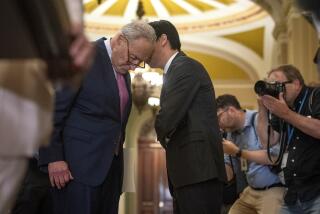Clinton’s Poor Ties to House Now Worsen
- Share via
WASHINGTON — There was the time the White House called a crucial meeting on the budget--and didn’t invite the Democrats’ budget specialist in the House of Representatives.
Then there was the time a White House letter so infuriated House Democrats that a top congressional aide ripped out two Capitol phones used by administration staff members.
And there was the 1996 election, when many Democrats blamed President Clinton’s fund-raising scandal for keeping their party from winning back control of the House.
Clinton may have broken what seemed like a Republican lock on the presidency, but his six years in office have been marked by a long history of ill will between the White House and erstwhile Democratic allies in Congress. Now that his political fate hinges on these Democrats, Clinton’s rocky Capitol Hill relations may come back to haunt him.
“It’s a very weak relationship, there’s no question about it,” said Rep. John P. Murtha (D-Pa.).
Some previous presidents have had a core of lawmakers willing to “walk the coals” for the White House, said a senior Clinton aide. But Clinton has few coal walkers. “We could sure use some more friends like that,” the aide said.
The lack of such support has been cast in bold relief by the contrast between the public reaction and the congressional response to independent counsel Kenneth W. Starr’s report on Clinton’s relationship with Monica S. Lewinsky. Polls have shown public approval of the president’s job performance remaining high in the wake of the report’s release. Despite that, congressional Democrats have been treating him this week as if voters were clamoring for impeachment.
On Monday, House and Senate Democratic leaders openly chastised the White House legal strategy. On Tuesday, some Senate Democrats privately suggested that it might be in the party’s interest for Clinton to resign. On Wednesday, House Democrats meeting in a closed-door caucus discussed options for censuring Clinton, fining him or even docking his pension, Capitol Hill sources said.
“Some of us would be willing to flog him,” said one California Democrat who asked not to be named. “This is a guy who let us down.”
Ironically, for the last year Clinton worked hard to mend fences within his party. He pushed an election-year agenda--regulating managed health care, improving schools, saving Social Security--that party leaders eagerly embraced and saw as good campaign issues.
But the Lewinsky scandal has all but submerged the White House agenda, at least for now. And the efforts Clinton has made to heal the breach with congressional Democrats may prove a matter of too little, too late.
“It takes more to ensure their continuing loyalty and support,” said Leon E. Panetta, Clinton’s onetime chief of staff and a former Democratic House member from Carmel. “You always have to keep in mind that there will be a time when you have to call on these people as a primary base of support. This is one of those times.”
Black Caucus to Serve as ‘Fairness Patrol’
Not all of the news from Congress has been disheartening for the president. Hours before the release of the Starr report Friday, leaders of the Congressional Black Caucus announced that they intended to serve as a “fairness patrol” for Clinton as possible impeachment proceedings play out. And some Democratic members of the House Judiciary Committee, the panel which would consider impeachment, are publicly arguing that Clinton’s misdeeds do not warrant such a penalty.
Still, such vocal support only underscores the relative silence from many other Democrats.
For most of Clinton’s term in office, a big source of tension between him and congressional Democrats has been his effort to steer their party down a “third way,” a policy course to the right of Democrats’ traditional liberalism and to the left of Republican conservatism.
Clinton’s major legislative triumphs--balancing the budget, reforming welfare and establishing free-trade policies--were negotiated principally with GOP leaders and put him bitterly at odds with liberals. That’s why White House officials made crucial decisions on the details of last year’s landmark accord to balance the budget without inviting such Democratic budget experts as Rep. John M. Spratt Jr. (D-S.C.).
It was in the heat of the budget debate that the Democratic congressional aide pulled the plug on White House lobbyists’ phones in the Capitol. (They were later plugged back in.)
Even Clinton’s critics acknowledge that his push to the center helped him win and keep control of the White House, breaking 12 years of GOP rule. But the particulars of his policy initiatives still rankle.
“The welfare bill is when I lost confidence and trust in him and I never got it back,” said one senior House Democrat.
Some of the tension between Congress and Clinton is rooted in personal style. Clinton never served in Congress, nor did he cultivate friendly relationships with a wide swath of lawmakers (in contrast to Presidents Reagan and Bush).
Panetta said that Clinton had a hard time making the transition from working, as governor, with a complaisant Arkansas Legislature to working with a more contentious Congress.
“He thought the Congress would be there, if needed, just the way the Arkansas Legislature was,” Panetta said. “But it’s a very different operation. These are all very independent people [on Capitol Hill] who have their own achievements and identities. You have to continually stroke them. “
To make matters worse, many Democrats link their loss of control of Congress in the 1994 midterm elections to public anger over Clinton’s failed health care initiative. And their hopes of reclaiming at least the House were dashed--in their eyes--by the stories of questionable Democratic fund-raising that surfaced in the waning days on the 1996 campaign.
Both assumptions are debatable--congressional Democrats had plenty to do with their own downfall--but they are widespread and perilous for Clinton.
“Ultimately, politicians are interested in their own personal situation and they want to be chairmen of committees and subcommittees,” said one key Democratic strategist. “There’s a sense that [Clinton] may have been part of depriving them of that.”
Still another glaring political problem for the president is that the top House Democrat, Rep. Richard A. Gephardt (D-Mo.), is thinking about challenging Clinton’s heir apparent, Vice President Al Gore, for the party’s 2000 presidential nomination. Administration officials are suspicious of Gephardt, and those feelings were intensified when his initial reaction to Clinton’s Aug. 17 speech seemed to them too critical. Clinton himself bristled and privately complained--to other Democrats and ultimately to Gephardt himself.
A common theme of the complaints among congressional Democrats about Clinton has been that he cares more about his own legacy than about the rest of his party.
His legislative strategy, critics said, has reflected the same kind of self-absorption that allowed him to get himself into the Lewinsky mess--putting his own gratification over policy and political goals.
That tension has fueled the party feud over Clinton’s legal position that he did not lie under oath when he denied having sexual relations with Lewinsky. That may be a good strategy for defending Clinton against perjury, Democrats fume, but it is a lousy political strategy that guarantees the controversy will not be resolved before election day.
* BEYOND VIDEOTAPE: House leaders debate how much sealed material in Lewinsky case to release. A18
* NOVEL ATTEMPT: Writers give the content in Kenneth W. Starr’s report on the president failing marks. E1
More to Read
Sign up for Essential California
The most important California stories and recommendations in your inbox every morning.
You may occasionally receive promotional content from the Los Angeles Times.














